Podiatrist in Freeport that Accepts Medicaid
The CEC Health Center, a Podiatrist in Freeport that Accepts Medicaid, (CEC) is a Federally Qualified Health Center (FQHC)* that provides integrated healthcare services at its Bethpage, Hauppauge and now Glen Cove locations. We provide care with excellence and compassion to historically underserved community members with limited incomes including those with autism, learning and developmental disabilities, and behavioral health concerns.
CEC recently merged with the Melillo Center for Mental Health in Glen Cove, a health center with over 40 years of experience serving the community in the heart of Glen Cove. Renamed CEC at Glen Cove, the Podiatrist in Freeport that Accepts Medicaid will continue to provide supports that include mental health clinic, outpatient chemical dependency outpatient services, assertive community treatment (ACT), supervised community residences, supported housing and respite housing.
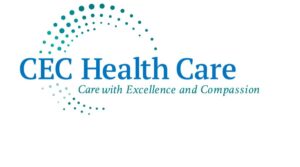
Directions From Freeport To Our Location in Bethpage!
Common Podiatric Conditions Treated By Podiatrist in Freeport that Accepts Medicaid
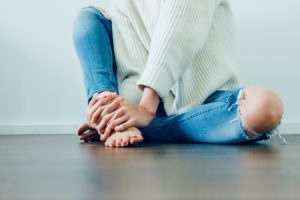
Did you know that the average American walks between 1,300 and 1,500 miles each year? With so much traveling to be done, the importance of taking proper care of your feet cannot be overstated. CEC Health Center, our team is well versed in all of the most common podiatric conditions a patient can face. If you begin to face any of the foot problems we go on to list, our podiatrist in Freeport that accepts Medicaid will be able to help.
Athlete’s Foot
As the name would suggest, this condition is common in athletes. However, they are not the only ones that suffer from it. Athlete’s foot is a fungal infection that affects the skin of the feet, usually between the toes. The main symptoms of this infection include itching, cracking, blistering, and peeling of the skin. A prescription-strength topical cream can be used to help combat this condition. To prevent this condition from ever occurring, our podiatrist in Freeport that accepts Medicaid recommends avoiding the following:
- Walking around barefoot in communal showers, gyms, or pools.
- Wearing socks and shoes that are warm and damp.
- Neglecting to thoroughly wash your feet after athletic activity.
Ingrown Toenails
Though they are more common in children, ingrown toenails can affect anyone and any age. An ingrown toenail occurs when the edge of a nail begins to grow into the surrounding skin. This incorrect growth of the nail can lead to pain, inflammation, and in some cases, infection. Wearing poorly fitting shoes, incorrectly trimming the toenail, and having a family history of suffering from ingrown toenails all increase the likelihood of them taking place. If you’ve noticed the development of one, consider utilizing the following methods of treatment and prevention:
- Washing feet with antibacterial soap and keeping the toes clean and dry.
- Don’t cut nails in a rounded pattern.
- Wearing shoes that fit well and have ample room in the toebox.
Plantar Fasciitis
If you’ve been dealing with heel pain, there is a high chance you’re currently being affected by plantar fasciitis. The plantar fascia is a thick band of tissue that connects your heel bone to your toes. When this tissue becomes irritated and inflamed, it is known as plantar fasciitis. Experiencing heel pain, especially in the morning when getting out of bed or during physical activity, is the most common symptom of this condition. While the exact cause of this inflammation is unknown, risk factors that increase its likelihood include the below:
- Carrying extra weight
- Having a high arch
- Having tight calf muscles
- Participating in activities that repeatedly put stress on the heel
Bunions
Also called hallux valgus, bunions are abnormalities of the feet that cause a bump to develop at the base of your big toe joint. Bunions are often caused by wearing tight/narrow shoes too often, however, they can also be caused by rheumatoid arthritis and trauma that occurs to your feet. When you begin to experience the following symptoms, be sure to reach out to our podiatrist in Freeport that accepts Medicaid to help:
- Difficulty moving your big toe
- A visible bump that takes place at the joint of your big toe
- Redness and tenderness around the bump
- Corns or calluses on the bones of your big toe
- Pain when walking
Heel Spurs
Heel spurs are bony calcium growths that take place between your heel bone and the arch of your foot. The development of these growths is caused by a long-term strain that is placed on muscles and ligaments around this area. Risk factors such as being obese, having arthritis, and continuously wearing worn-out shoes also play a role in the formation of heel spurs. While some patients are lucky enough not to face any symptoms as a result of these growths, others are subject to mass amounts of pain and inflammation. Though they are sometimes difficult to detect, our team at CEC Health Center will be able to properly diagnose your heel spurs and move forward with the form of treatment that will yield the optimal results.
Contact Our Podiatrist in Freeport that Accepts Medicaid
Here at CEC Health Center, we are committed to providing the typically underserved members of the community with the healthcare services they need. As a multidisciplinary facility, we help patients overcome a wide range of medical issues. Our podiatrist in Freeport that accepts Medicaid has years of experience with treating common podiatric conditions and will help you overcome yours. To schedule your appointment for foot care, contact us today!
What Causes Flat Feet?
Feet pain is not easy to deal with and can worsen if it’s not treated correctly. Flat feet, also known as pes planus, is an example of a condition that can cause this pain. At CEC Health Center, we provide podiatry services! If you’re interested in seeing a Podiatrist in Freeport that Accepts Medicaid, please visit our facility today. Read more below to learn about flat feet.
Flat Feet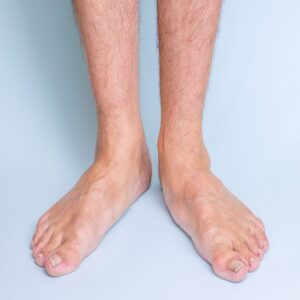
Individuals with flat feet have a different foot shape, including either low or no arch in the feet. The sole makes complete or near-complete contact with the floor. This condition develops when the tendons do not gather together to form an arch. There are two types of flat feet: flexible flat feet, commonly found in the pediatric population, and rigid flat feet, which are developed in adulthood. We have a Podiatrist in Freeport that Accepts Medicaid at our facility to solve any of your flat feet problems. Read below to learn about the several causes and risks of flat feet:
- Injuries and fractures to the foot area
- Damaged tendons
- Obesity
- Diabetes
- Pregnancy
- Arthritis
Once you schedule your appointment with us, we will provide you with a proper evaluation and determine your diagnosis. We will obtain your medical history and observe your leg and feet movements. We will also do other forms of exams such as X-Rays, ultrasounds, CT-Scans, or an MRI. This will allow us to determine your condition and develop a treatment plan.
Treatment of Flat Feet
Flat feet should be treated immediately if you are experiencing any pain or imbalance. Simple remedies can also be changing your footwear or using ice/heat to the swollen area. Flat feet can also be treated by obtaining an orthotic device. The podiatrist will provide a custom-made device that you put in your shoes to comfort and support your feet. Another treatment option is to participate in stretching exercises to relieve pain. Physical therapy is another option that your podiatrist may suggest. You can also have medication prescribe
Contact Our Podiatrist in Freeport that Accepts Medicaid Today!
Feet pain is not easy to deal with and can worsen if it’s not treated properly. Flat feet, also known as pes planus, is an example of a condition that can cause this pain. At CEC Health Center, we provide podiatry services! If you’re interested in seeing a Podiatrist in Freeport that Accepts Medicaid, please visit our facility today.
Can Custom Orthotics Treat Lower Back Pain
Back pain is one of the most common medical problems. Whether mild or acute, you will likely experience back pain at least once throughout your lifetime. It is often very hard to figure out what is causing the pain and how to treat it. If you have back pain, it could be because of your feet which means you may need custom orthotics from a Podiatrist in Freeport that Accepts Medicaid. Contact us today to learn more!
What Are Orthotics?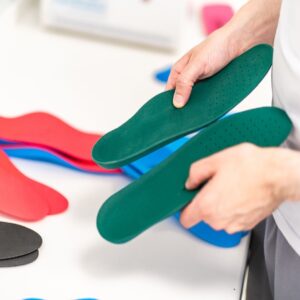
Orthotics are a special shoe or heel inserts custom-made specifically for you and are prescribed by a Podiatrist in Freeport that Accepts Medicaid. While you can find a heel pad and shoe insert at many athletic stores, orthotics are highly customized for your feet. There are two different kinds of orthotics:
- Rigid Orthotics: these are also known as functional orthotics and are made of plastic or carbon fiber. These are best for walking shoes or dress shoes with low heels and a closed toe. Rigid orthotics are designed to reduce pain in your feet and strains in the legs or lower back.
- Soft Orthotics: these are also known as accommodative orthotics, made from soft compression material. They provide cushioning and help reduce plantar fasciitis or diabetic foot ulcers.
What Conditions Do Orthotics Treat
There are many reasons why a doctor might prescribe orthotics to a patient. One reason is to treat back problems. Some individuals experience back pain due to poor positioning of the feet. This means that the arches may roll inward, or a lack of cushioning causes pain. Orthotics can fix these problems and overall realign how the feet lay on the ground, affecting the body’s entire posture.
Improving The Kinetic Chain
As mentioned above, orthotics realign and stabilize the position of your feet, which helps improve posture. The medical term for this is the kinetic chain. The base of the kinetic chain is the feet. Also, every joint above the feet is a link to this chain. If your feet are pronated while walking, the kinetic chain is negatively affected. Pronated feet also cause the knees to become knocked-knees which means they come together. This messes with the angulation of the hips and knees, which destabilizes the pelvis. When the pelvis is not stabilized, this can affect your posture and spine, causing pain in the back. This goes for supination of the feet as well. Orthotics can help correct foot pronation and supination.
Benefits of Orthotics
There are many benefits to wearing orthotics, some of which have to do with treating back pain.
- Reduce Pain
- Correct Pronation: Pronation is when the ankle falls toward the middle of the body due to collapsed arches. This increases stress in the lower back and leads to knee injuries. Orthotics provide support for the arches.
- Correct Supination: Supination has very high arches. This causes the ankles to lean outward from the middle of your body. This, too, puts stress on the lower back, especially if one foot has a higher arch than the other. This puts the whole body off balance. Orthotics help to maintain a more anatomically correct position.
- Enhanced Athletic Performance: Since orthotics keep your whole body well-aligned, you can perform better while playing sports and avoid injury.
Why You Need Orthotics Over A Simple Shoe Insert
Inserts that you find in the store provide cushioning and support for your feet. They are usually made of a material such as gel, plastic, or foam to fit inside your shoe. The problem with these is that they are not made for your feet precisely. With this being said, they may make your shoes more comfortable and provide some extra support, but they will not correct your foot problems that may be causing back pain. Orthotics are different as prescribed by a Podiatrist in Freeport that Accepts Medicaid. These medical devices fit into your shoes to correct your specific foot issues. They can change the way you walk, stand, or run.
Visit Our Podiatrist in Freeport that Accepts Medicaid
If you are looking for a Podiatrist in Freeport that Accepts Medicaid, contact the CEC Health Center. Our goal is to provide high-quality, comprehensive healthcare to underserved communities with limited incomes. Our podiatrists use the highest standard of medical care so that you can achieve a healthy lifestyle and get back on your feet without any back pain! If you are looking to get orthotics, contact our team today!
How Do You Calm Down Neuropathy?
Did you know that the most common symptom of this condition is pain, usually in the feet and hands? Neuropathy is a condition that affects your nerves. Your doctor may prescribe medications to reduce the pain if it becomes severe enough, causing problems with day-to-day activities. If you’re looking for the best Podiatrist in Freeport that Accepts Medicaid, visit the CEC Health Center today! Here are many things you can do to reduce neuropathy symptoms besides taking medications. Many people find relief from lifestyle changes, physical therapy, acupuncture, or massage therapy. Sometimes it is helpful to use all of these methods together in order to manage your pain best and reduce the day-to-day impact on your life.
Helpful Tips To Clam Down Neuropathy!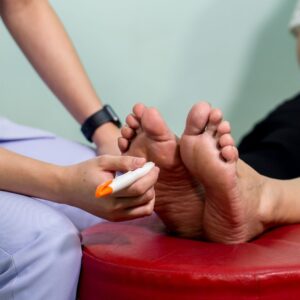
One simple tool that you could use is a foot massager. This is the easiest and most comfortable way that many people find relief from neuropathy pain. You can search online for the best foot massagers, read reviews, and purchase one that will provide comfort at home. There are even specific machines made to relieve foot pain which you can buy. Our Podiatrist in Freeport that Accepts Medicaid, can help you calm down neuropathy today!
You can also use a cold pack if you have swelling or inflammation. Applying a cold pack for fifteen minutes several times per day may help to reduce the swelling and improve your comfort level.
In addition to using a foot massager, there are other things that you can do to help relieve the symptoms of neuropathy. One is to make changes to your diet. Eating healthy and nutritious foods can help improve your overall health and reduce inflammation. Some people find that cutting out processed foods and eating more organic fruits and vegetables helps to ease their symptoms.
Also, its best to exercise regularly. Exercise helps to improve circulation and reduces inflammation. It is important to avoid exercises that put pressure on your feet when you have neuropathy, such as high-impact activities. Low-impact exercises, such as swimming or biking, are a good choice and can help to improve your overall fitness level.
Contact Our Podiatrist in Freeport that Accepts Medicaid
If you are experiencing pain from neuropathy, it is important to seek relief. There are many different ways to find relief, and using a foot massager is one of them. It is a simple solution that can provide comfort and relief from your symptoms. Talk to your doctor if the pain becomes severe enough to interfere with your day-to-day activities. If your looking for the best Podiatrist in Freeport that Accepts Medicaid, visit the CEC Health Center today!
Contact Us
CEC has three sites serving the Long Island community
Nassau County
Bethpage
857 South Oyster Bay Road, Bethpage, NY 11714
Map
(516) 622-8888
Monday through Thursday, 8:00 a.m. – 8:00 p.m.
Friday, 8:00 a.m. – 5:00 p.m.
Glen Cove
113 Glen Cove Avenue, Glen Cove, NY 11542
Map
(516) 622-8888
Chemical Dependency Clinic
Monday: 9:00 am – 8:00 pm
Tuesday: 8:00 am – 8:00 pm
Wednesday: 9:00 am – 8:00 pm
Thursday: 9:00 am – 8:00 pm
Friday: 9:00 am – 5:00 pm
Mental Health Clinic
Monday: 9:00 am – 5:00 pm
Tuesday: 9:00 am – 7:00 pm
Wednesday: 9:00 am – 7:00 pm
Thursday: 9:00 am – 7:00 pm
Friday: 9:00 am – 5:00 pm
Suffolk County
Hauppauge
305 Oser Avenue, Hauppauge, NY 11788
Map
(516) 622-8888
Mon, Wed, Thu, Fri, 9:00 a.m. – 5:00 p.m.
Tue, 12:00 p.m. – 8:00 p.m.
If you have any questions, please contact us using the form below:

Podiatrist Service
113 Glen Cove Avenue, Glen Cove, NY 11542
$$
(516) 622-8888
on
Rating: 5
